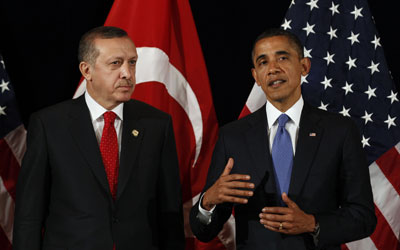WASHINGTON (TURKISH JOURNAL)
Bir grup uluslararası yabancı STK, Türkiye’de ”Demokrasi” ve ”İnsan Hakları” için Obama’dan, Erdoğan’la olan ”arkadaş”lığını kullanmasını istedi.
Aralarında, Dış Politika İnsiyatifi (Foreign Policy Initiative), Bilgi Özgürlüğü için Sınır Tanımayan Muhabirler, Ortadoğu’ya Demokrasi Projesi (Project on Middle East Democracy-POMED) ve Freedom House’un da olduğu bir grup uluslararası sivil toplum kuruluşu (STK), ortaklaşa kalem aldıkları mektupta, Başbakan Recep Tayyip Erdoğan’ı ”arkadaş”ı ABD Başkanı Barack Obama’ya ”şikayet” ettiler.
”Başbakan Erdoğan’la yakın kişisel ilişki inşa etmenize saygı duyuyoruz” denilen mektupta, ”Size, Edoğan’la olan yakın ilişkiniz çerçevesinde, hukuk ve siyasi özgürlüklere öncelik verilmesi için çağrıda bulunuyoruz.” ifadesine yer verildi.
Ergenekon davasındaki hukuk sürecini eleştiren ve ”Kürt sorunu” konusunda atılan adımları yetersiz bulan bu bir grup STK, mektuplarında, ”Türkiye’nin Batı’da demirlemesi için ABD’nin sürekli, Türkiye’nin AB ve NATO’ gibi Avrupa’nın önde gelen güvenlik ve ekonomik kurumlarının içine dahil edilmesini desteklemesi gerektiği” ifadesini kullanıyor.
Başkan Obama’ya yaptıkları çağrıyla, Türkiye’ye 3. dünya ülkesi muamelesi yapan STK’ların, yazdıkları mektubu, Türkiye’nin içişlerine karışma noktasına vardırarak, tepeden bakan bir dil kullanmaları göze batıyor.
Sözkonusu mektubun tam orjinal metnini aşağıda bulabilirsiniz:
January 10, 2013
The Honorable Barack Obama
President of the United States of America
The White House
1600 Pennsylvania Avenue, NW
Washington, D.C. 20500
Dear Mr. President,
Turkey is a longstanding and valuable ally of the United States. On a bipartisan basis over the course of ten Presidencies, the United States has supported democratic and economic reform in Turkey, as well as the emergence of civilian control over the military and the expansion of human rights and civil liberties. In order to anchor Turkey in the West, the United States has consistently supported Turkey’s inclusion in the premier security and economic institutions of Europe—NATO and the European Union.
We are concerned, however, that in recent years Turkey’s progress has stalled and in some crucial areas regressed. As noted in the U.S. State Department’s most recent Human Rights report on Turkey: “The arrest and prosecution of journalists, writers, and Kurdish intellectuals and political activists, coupled with condemnatory speeches by political leaders, had a chilling effect on freedom of expression.”
Since that report was issued, the situation has only gotten worse. An October 2012 report by the Committee to Protect Journalists stated that Turkey now has “the disreputable distinction of being the world’s worst jailer of the press”—an analysis shared by Reporters Without Borders. These developments have had a detrimental effect not only upon Turkey internally, but also hinder Turkey’s contribution on the world stage.
Prime Minister Erdogan has recently voiced support for anti-blasphemy laws that would further restrict freedom of speech. The government has largely abandoned efforts to protect Kurdish minority rights and to end the armed Turkish-Kurdish conflict. Hundreds of military officers, as well as various scholars and journalists, have been arrested and charged through trials dogged by allegations of fabricated evidence used by the prosecution. Many now face prison terms of twenty years or more pending appeal. Moreover, given that many of these officials have worked closely with the United States and our NATO allies over the years, these trials are also a blow to NATO’s overall collective capability. Finally, Turkey, once a leader in the region on the role of women in society, has alarmingly few women in high level government positions and professions, and has seen a steady decline in women’s participation in the labor force.
America’s close ties to Turkey and our considerable stake in Turkey’s future require attention to these developments. With respect, you have reportedly built a close personal relationship with Prime Minister Erdogan. We urge you to express publicly and privately America’s concerns about Turkey’s backsliding, and to direct diplomatic efforts toward ensuring that Turkey resumes a course designed to consolidate democracy and the rule of law.
Given recent developments in the Middle East, especially in Syria, but also across the region, close U.S.-Turkish relations are more important than ever. That relationship, however, needs to be based on our shared values, not just shared strategic interests. We urge you to make rule of law and political freedoms a priority in your engagements with Prime Minister Erdogan.
Sincerely,



